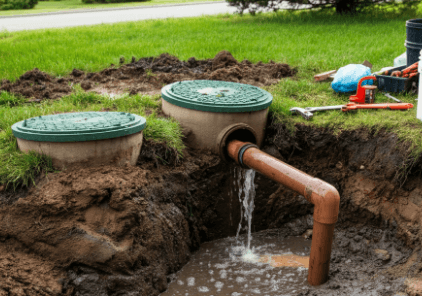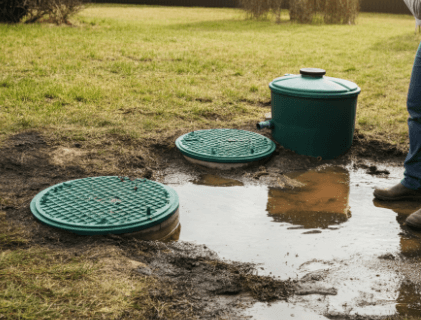A failed septic system can be a major hurdle when selling your home, especially in Florida, where over 2 million properties rely on them. Issues caused by age, storm flooding, or lack of maintenance can lead to repair bills costing thousands of dollars, not to mention the complex county permits and inspections required. This reality leads many homeowners to ask, “Can I sell my house with a failed septic system in Florida?” While traditional sales are difficult because most lenders and insurers won’t approve a property with a non-functioning septic system, a solution exists. As renowned Florida real estate investors and cash home buyers, Steve Daria and Joleigh regularly purchase homes in as-is condition, including those with significant septic issues. They handle all the repairs and complexities after the sale, providing you with a fast, fair cash offer. So if you’re asking, “Can I sell my house with a failed septic system in Florida?” and want to bypass the stress and expense, there is a clear path forward. Book a free, no-obligation discussion with Steve Daria and Joleigh to explore your options today.
What is a Failed Septic System?
Before discussing “Can I sell my house with a failed septic system in Florida,” it’s essential to understand that a failed septic system occurs when the system is no longer effectively treating and disposing of wastewater.
This can result from various issues, such as clogs, leaks, or the age of the system itself.
The signs of a failed septic system can include slow drains, foul odors, and even sewage backups.

Why Homeowners Should Be Concerned
When your septic system fails, it poses substantial health risks due to the probable exposure to untreated sewage, which can lead to severe infections and illnesses.
This issue can also lower your property value significantly, as buyers will factor in the cost and inconvenience of necessary repairs or replacements.
Key Indicators of a Failed Septic System
Recognizing the key indications of a failing septic system can help homeowners take timely action before putting their property on the market.
Foul Odors
A persistent, unpleasant smell around the septic tank or drain field indicates a failing septic system.
These odors are caused by gases and untreated waste escaping from the system.
Addressing these smells promptly is essential to prevent them from becoming a constant nuisance and to avoid further health hazards.
Slow Drains
When the septic system malfunctions, water drains slowly from sinks, tubs, and toilets.
This issue occurs because the septic tank or drain field is overloaded or clogged, preventing wastewater from flowing through the system efficiently.
Slow drains are usually an early warning sign of more severe septic problems that need immediate attention to avoid complete system failure.
Sewage Backup
Wastewater backing into the home or pooling around the septic system indicates a severe malfunction.
This situation is unpleasant and poses significant health risks due to the exposure to raw sewage.
Immediate action is required to fix the underlying issues and prevent extensive damage to your home and property.
Get An Offer Today, Sell In A Matter Of Days
Legal Obligations
In Florida, homeowners must follow specific regulations when marketing any property with a failed septic system.
Notifying potential buyers about the issue upfront is essential, as failing to disclose this information can lead to legal repercussions.
Florida’s Septic System Disclosure Requirements
Florida law mandates that homeowners disclose any known defects, including issues with the septic system. See the Florida Homeowner Disclosure Law.
Non-disclosure can result in lawsuits and fines.
Sell My House with a Failed Septic System
Here are some practical approaches to “Sell my house with a failed septic system in Florida.”
Disclose the Issue
The first and most crucial step is to be transparent about the condition of the septic system.
Transparency builds trust and respect, setting the right expectations for potential buyers.
By disclosing the issue upfront, you avoid possible legal disputes and ensure a smoother negotiation process.

Get an Inspection
Before listing your property, hire a certified inspector to assess the septic system.
This inspection report can provide detailed information about the extent of the failure and the necessary repairs.
A professional evaluation also lends credibility to your disclosure and helps buyers understand the scope of the issue.
Offer a Repair Credit
To make your property more enticing, consider offering a repair credit.
This allows buyers to deduct the cost of repairs from the purchase price, making the deal more attractive.
By providing this option, you can speed up the sale process and give buyers confidence in addressing the septic system issue after purchase.
Tips for Homeowners
Here are some practical tips to manage a failed septic system and prepare your property for sale:
Regular Maintenance
Even if your system has failed, regular maintenance can prevent further complications.
Schedule routine pumping and inspections to keep the system as functional as possible.
This ongoing care can help manage the symptoms of the failure and prevent the system from causing additional damage to your property.
Regular maintenance demonstrates to potential buyers that you have proactively managed the issue.
Temporary Solutions
Consider temporary fixes, such as using enzyme treatments to break down waste and reduce odors.
These short-term solutions can help manage the situation while you prepare to sell.
Though not a permanent fix, enzyme treatments can improve the condition of your septic system enough to make the property more presentable during the selling process.
Additionally, these measures can buy you some time to explore more long-term solutions.
Consult Professionals
Always consult with septic system professionals.
Their expertise can guide you through the necessary repairs and help ensure compliance with local regulations.
Professional advice is important for understanding the extent of the failure and determining the best course of action to take.
Takeaway
- Impact on Traditional Sales: A failed septic system makes it nearly impossible to sell your home traditionally, as most lenders won’t approve a mortgage, and insurers will deny coverage until it’s fixed. This significantly shrinks your pool of potential buyers to those who can pay cash and handle the repairs themselves, leading many homeowners to ask, “Can I sell my house with a failed septic system in Florida?”
- Costs and Timelines for Repairs: Replacing a failed septic system in Florida is a costly and lengthy process due to required permits, soil testing, and inspections. Repairing a drainfield might be cheaper, but it still involves significant cost and regulatory hurdles that can delay a sale.
- Disclosure and Inspection Requirements: Legally, all known defects, such as a failed septic system, must be disclosed to buyers to avoid lawsuits. A professional inspection report and repair quotes build trust and transparency, aiding negotiations even for “as-is” sales.
- Pricing and Negotiation Strategies: Traditionally, you can offer a credit at closing or put funds in escrow for replacement costs, but this cuts into your profit. Or, price the home aggressively “as-is,” attracting investors but likely resulting in a much lower offer.
- Opting for a Cash Buyer: Selling to a cash buyer offers a quick, simple solution, avoiding lenders, repairs, and uncertainty. For a fair cash offer and flexible closing, book a free, no-obligation chat with Florida investors Steve Daria and Joleigh.
**NOTICE: Please note that the content presented in this post is intended solely for informational and educational purposes. It should not be construed as legal or financial advice or relied upon as a replacement for consultation with a qualified attorney or CPA. For specific guidance on legal or financial matters, readers are encouraged to seek professional assistance from an attorney, CPA, or other appropriate professional regarding the subject matter.

